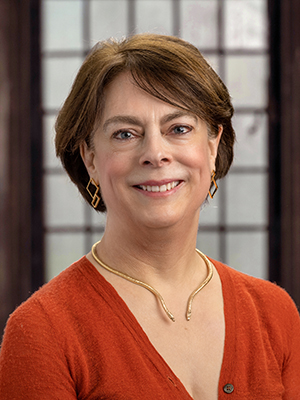Ardis Butterfield
Ph.D., M.A., Trinity College, Cambridge
M.A. University of Bristol
Ardis Butterfield specialises in the literatures and music of France and England from the 13th to 15th centuries. Born in Pakistan, and educated in South India and England, she took her BA and PhD degrees at Trinity College, Cambridge. She was elected to a Research fellowship at Downing College, and appointed Lecturer, Reader, and then full Professor at UCL before coming to Yale in 2012. She was awarded two Leverhulme Research Fellowships, one in 2003-04 and a Major Fellowship in 2008-11. Her teaching and scholarship are grounded on continental and insular vernacular manuscripts and the social, material, and theoretical ways in which they record how writers and composers worked and thought. She has particular interests in the medieval lyric and lyric theory; word and music relationships; Chaucer and nationhood; city writing; bilingualism, translation, and medieval and modern linguistic identities; and theories and histories of language, form, and genre. With courtesy appointments in the departments of French and music, her scholarship distinctively traverses disciplines.
Butterfield’s books include Poetry and Music in Medieval France (2002), and The Familiar Enemy: Chaucer, Language and the Nation in the Hundred Years War (2009) which won the 2010 Society for French Studies R.H. Gapper Prize, was a Choice Outstanding Academic Title (2010), and presented to the Académie Française in Nov. 2010. She has edited three collections of essays: Chaucer and the City (2006), Performing Medieval Text (2017) with Henry Hope and Pauline Souleau; and, most recently, Literary Theory and Criticism in the Later Middle Ages: Interpretation, Invention, Imagination: Essays in Honour of Alastair Minnis, co-edited with Andrew Kraebel and Ian Johnson (Cambridge: Cambridge University Press, 2023); and published some 60 articles and essays. She has held visiting appointments at the University of Virginia, the Huntington Library, San Marino and All Souls College, Oxford. Most recently, she spent 2018-19 as a visiting fellow of Trinity College, Cambridge and senior research fellow at the Faculty of English, University of Cambridge. She was elected President of the New Chaucer Society in 2016 – 2018 and is co-founder and co-editor (from 2017) of the monograph series Oxford Studies in Medieval Literature and Culture. Among her many advising and board member roles, she is Executive Board Member of the INSL (International Network for the Study of Lyric) https://lyricology.org/.
Butterfield is currently completing a new Norton edition of medieval English lyrics, and writing a book on medieval song, tentatively called Medieval Songlines: Theory of Medieval Song. The edition has provoked her to rethink approaches to medieval lyric, taking into account notions of rhythm, repetition, silence and writing, and the pressures and tensions of history on voice formation in multilingual song genres. She will be giving three linked lectures in the inaugural Princeton Seminar in Poetry and Poetics in 2022-23.
For a 2015 interview at the Yale Macmillan Centre, see: https://www.youtube.com/watch?v=KFdPWu0-N2c
Selected Publications
“Lyric Editing” in What Kind of a Thing Is a Middle English Lyric?, ed. Cristina Maria Cervone and Nicholas Watson. University of Pennsylvania Press, Philadelphia, 2022, pp. 45-73.
“The Dream of Language”: Chaucer “en son Latin”, Presidential Address, Twenty-First Biennial International Congress of the New Chaucer Society Toronto, Canada, 10-15 July, 2018, Studies in the Age of Chaucer, 41 (2019), 3-29
‘Medieval lyric: a translatable or untranslatable zone?’ in World Poetics, Comparative Poetics: Special Issue of University of Toronto Quarterly, guest editors Jonathan Hart and Ming Xie (in press, 2018)
Review of David Wallace: Europe: A Literary History 1348-1418, London Review of Books, 26 April 2018
‘Poems without form? Maiden in the mor lay revisited’, Readings in Medieval Textuality: Essays in Honour of A. C. Spearing, edited by Cristina Maria Cervone and D. Vance Smith (Woodbridge: Boydell and Brewer, 2016), 169-94
‘Who was Chaucer?’, Diary, London Review of Books, 27 August, 2015
‘Afterwords: Forms of Death’, Response to Special Issue of Exemplaria: New Approaches to Medieval Genre, ed. Shannon Gayk and Ingrid Nelson, Vol. 27 No. 1–2, Spring/Summer 2015, 167–182
“Why Medieval Lyric?”, ELH: Essays from the English Institute 2013: Form), 82:2 (2015), 319-343
With Helen Deeming, ‘Editing insular song across the disciplines: Worldes blis’, Probable Truth: Editing Medieval Texts from Britain in the Twenty-First Century, ed. Vincent Gillespie and Anne Hudson (Turnhout: Brepols, 2013), pp.151-66
‘Fuzziness and Perceptions of Language in the Middle Ages: Part One: Explosive Fuzziness: The Duel’ in Fuzzy Studies. A Symposium on the Consequence of Blur, ed. Jeffrey M. Perl, special issue of Common Knowledge, 18:2 (2012), 255-266; Part Two: Collective Fuzziness: Three Treaties and a Funeral’, 19:1 (2013), 51-64; and Part Three: Translating Fuzziness: Countertexts’, 19:2 (2013), 446-73
‘Rough Translation: Charles d’Orléans, Lydgate and Hoccleve’ in Rethinking Medieval Translation: Ethics, Politics, Theory, ed. Emma Campbell and Robert Mills (Cambridge: D.S. Brewer, 2012), pp.204-25
‘The construction of textual form: cross-lingual citation in some medieval lyrics’, in Citation, Intertextuality and Memory in the Middle Ages and Renaissance, edited by Yolanda Plumley, Giuliano Di Bacco and Stefano Jossa (Exeter: Exeter University Press, 2011), 41-57
‘Guerre et paix: l’anglais, le français et « l’anglo-français »’, Journée d’études anglo- normandes, organisée par l’Académie des Inscriptions et Belles-lettres, Palais de l’Institut, 20 juin 2008: Actes, édités par André Crépin et Jean Leclant, Académie des Inscriptions et Belles-lettres (Paris: De Boccard, 2009), 7-23
‘Lyric’, The Cambridge Companion to Medieval English Literature 1100-1500, ed. Larry Scanlon (Cambridge, 2009), 95-109
‘Chaucerian Vernaculars’, Studies in the Age of Chaucer, 31 (2009), 25-51
Courses
Lecture Courses:
- The Multicultural Middle Ages (co-taught with Marcel Elias)
- Chaucer and Medieval London
Junior Seminar:
- Medieval Songlines
- Medieval Shorts (co-taught with Howard Bloch)
- Medieval Biography
Graduate seminar:
- Chaucer and Medieval Translation
- Lyric History and Theory: Medieval and Modern (co-taught with Langdon Hammer)
- The Medieval Lyric





